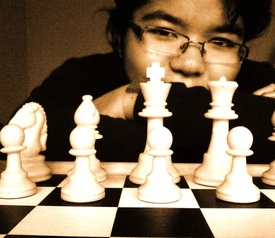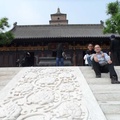Patricia Arakawa is 22 years old and is sansei; She studies Mathematics and is fond of poetry and chess. She is a columnist in the newspaper Perú Shimpo and also posts her thoughts and concerns on patyna127.blogspot.com under the pseudonym Patydrómeda.
PATY: Discrimination in Lima?
In what is my personal experience, I could not speak ill, and that, I have studied all my life in non-Nikkei schools where my brother and I were always the "lunars." On the contrary, every place I have gone I feel that Nikkei people are well regarded. There is no shortage of opinions of "I admire their culture", or "how lucky you are to have Japanese ancestry". I think that the general opinion of the Nikkei is that of an honest, hard-working and caring person, and what's more, this image has apparently been reinforced in the way Japan recovered from the tragedy of the tsunami. This concept, that of the country that, even though it is so small, is progressive, has been transferred to the concept they have of the Nikkei, and that has partly benefited us a lot.
Who, then, would have the courage to discriminate against an honest and hard-working person? Although it is true that not everyone sees it that way.
In college, I remember, I once heard a comment: "Those Chinese should go back to their country...they are taking vacancies away from ours." Well, they are things that are said out of ignorance, I never paid more attention to them.
There are also those who get upset when they are called "Chinese" because, they say, they are not Chinese, they are Japanese (hahaha) but anyway, other variables come into play and it depends on the point of view. For example, I don't get upset when they call me 'Chinese', but it's not like I like it either.
Rather, I believe, it is we Nikkei who sometimes tend to be racist. For example, in newspapers I often read advertisements like "Nikkei cashier needed" or "Nikkei teacher needed", and why oh? What's more, even my mother tells me to marry a Nikkei!
VICTOR: They also told me to “find myself” a woman with “similar” customs, subtle, saying, after all, Nikkei. It was not so.
At university – before studying advertising – I suffered discrimination by some ignorant people who believed they were better than others and therefore despised and minimized what “is not Peruvian”…? They did not have in mind that Peru is built on the sum of many cultures and customs, some very different from those considered “native.” This was the time when Alberto Fujimori had widespread presence and approval.
I still see these attitudes but with masks, without frankness, out of fear, out of cowardice. It's what you see in every ignorant person.
This type of thing was what, at the beginning, urged me to write, creating a catharsis with my liver articles that, happily, have changed (the negative cannot disappear with the negative... in reality it does not disappear, it can be changed... starting with oneself).
Thus, I wrote about social problems and some that concerned the Nikkei community, although I could never understand the totally Nikkei approach because first we are human (and if you like, second, Peruvian).
That is why I write for everyone and it is difficult for me when the topic is restricted to something so specific even though we Nikkei have a very extensive repertoire of participation.
PATY: Oh look, Víctor, that was in the 90's, just when the man who ran the country was one of non-Peruvian roots... how curious.
Leaving Lima a little, I had a cousin, by the way, who was the son of a Peruvian (net) and a mother with Japanese roots. He traveled to Nihon when he was 5 years old and was teased at school for his poorly spoken Japanese, and even more so, for his last name. The boy no longer wanted to go to study. Happily that seems to be changing, since seeing that today is out of place.
I can't imagine, for example, someone, in our current Lima, minimizing and despising what is "non-Peruvian." It would be incongruent with one's own ideology because even the most nationalist listens to Argentine or Chilean rock, watches American movies and shows, uses MP4 made in China, follows Japanese anime, or has eaten at KFC, etc.
Do you still, Victor, suffer this type of discrimination?
When you write about your liver articles, hehe I agree with you, it seems to me that everyone at some point (including myself) has written with the liver in their mouth, which is not bad, I consider catharsis something healthy.
VICTOR: Sometimes I meet people who still discriminate and are old people with deep-rooted erroneous beliefs or are snobs who believe they are perfect in many ways. But I no longer pay attention to this type of people, I accept them as they are and there they remain, forgotten... there are much better things to pay attention to.
What you say is very true about the products and services of multiple origins that we use and buy, but few realize it... it is enough for them to associate the product with the place where they bought it without knowing the origin of the brand or capital of any of them included. the place.
It is the lack of community that we experience today, through the ill-conceived globalization in a supposed era of information technology that does not even reach half of humanity that is lost in itself, without inner development, with empty spirits and little projection. about themselves, that is, what they want to do with their lives and how they want to live their presents.
© 2012 Victor Nishio Yasuoka












